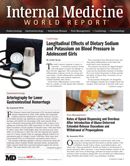Publication
Article
Internal Medicine World Report
Musculoskeletal Pain, Limited Physical Function in Obese Teens
Author(s):
A new study of obese adolescents highlighted the link between obesity and chronic musculoskeletal (MSK) pain and limitations on physical function and quality of life (QOL).

A new study of obese adolescents highlighted the link between obesity and chronic musculoskeletal (MSK) pain and limitations on physical function and quality of life (QOL).
The Teen-Longitudinal Assessment of Bariatric (Teen-LABS) study collected data between February 28, 2007 and December 30, 2011, on 233 adolescents who underwent weight-loss surgery at five US centers.
Their primary goal was to evaluate associations between MSK pain and self-reported physical function as well as weight-related QOL. The team also evaluated the association between MSK pain and high-sensitivity C-reactive protein (CRP), a marker of systemic inflammation correlated with pain and joint disease. Results were reported in JAMA Pediatrics.
The team used a visual analog scale to assess MSK pain and pain intensity of the lower back, hips, knees, and ankles/fees. The also utilized the Health Assessment Questionnaire Disability Index to better understand the self-reported physical function status, and used the Impact of Weight on Quality of Life-Kids (WRQOL) to measure weight-related QOL.
Naturally adjustments were made for sex, race, age at surgery, body mass index, and clinical depressive symptoms.
Among the 233 study participants (predominantly female, white, and non-Hispanic), 49% had poor functional status and 76% had MSK pain.
Lower back pain was prevalent (63%), followed by ankle/foot (53%), knee (49%), and hip (31%) pain; 26% had pain at all 4 sites. Compared with pain-free participants, those reporting lower extremity pain had greater odds of having poor physical functioning (P <.01). Compared with pain-free participants, those reporting lower extremity pain had significantly lower WRQOL scores and physical comfort scores.
No significant relationship was witnessed between MSK pain and high-sensitivity CRP.
The investigators recommend a longitudinal follow-up in this cohort to find whether weight loss surgery reverses pain and physical function limitations and improves QOL.






